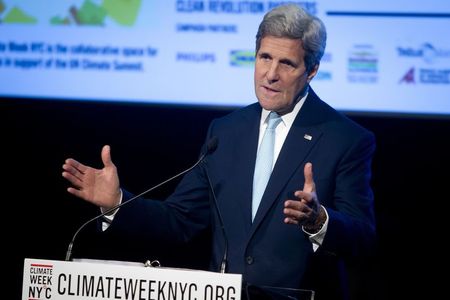By Valerie Volcovici
NEW YORK (Reuters) - With crises from Islamic State to Ebola competing for attention, the United Nations on Tuesday will zero in on climate change, giving leaders from 125 countries a platform to explain how they plan to address the issue.
A huge march to call for international action on climate change, which brought as many as 400,000 people to the streets of New York on Sunday, set the tone for the summit spearheaded by U.N. Secretary-General Ban Ki-moon.
The private sector also helped create a buzz around the summit, with corporate chief executives like Apple's Tim Cook and Ikea's Peter Agnefjäll declaring a variety of voluntary measures to reduce their carbon emissions.
Among the most highly anticipated speakers on Tuesday will be U.S. President Barack Obama, whose administration has sought to make U.S. leadership on climate change a legacy goal.
The White House announced on Tuesday that Obama would issue an executive order to require federal agencies to ensure their international development programs and investments are designed to help communities adapt to the impacts of climate change.
Secretary of State John Kerry hinted on Monday at what else Obama is expected to highlight when he takes the podium.
"Over the past five years, the United States has actually done more to reduce the threat of climate change domestically and with the help of our international partners than in all of the 20 years before that," he said.
He added the United States was on track to meet its international pledge to cut its greenhouse gas emissions 17 percent below 2005 levels by 2020 because of Obama's climate policies.
Leaders who will be absent from Tuesday's gathering include Chinese President Xi Jinping and Indian Prime Minister Narendra Modi, who represent the first and fourth biggest greenhouse gas polluters.
SEEKING POLITICAL MOMENTUM
The summit is meant to add political momentum to a U.N. process to negotiate a climate-change agreement in Paris by 2015.
By holding the high-level gathering almost 16 months before the Paris deadline, Ban has ensured that climate change will be at the forefront of every leader's agenda, EU climate change commissioner Connie Hedegaard told Reuters in an interview.
"With all the outreach we need to do in this area, it is crucial that all the foreign ministries are taking this up," she said.
She said the fact that foreign ministers, including Kerry and France's Laurent Fabius, discussed climate deal negotiations on Sunday in a meeting of the world's 17 biggest emitting countries was a sign that the issue had become a policy priority.
But Hedegaard and Fabius highlighted what could be a roadblock to a Paris pact – agreement on the legal basis of the final deal.
U.S. negotiators have acknowledged that a deeply polarized Congress is unlikely to ratify a legally binding U.N. treaty.
"We have to have a legal agreement, otherwise it will be just words," Fabius said on Monday.
Ban said there was a greater sense of "anxiety" around the issue than at previous gatherings in New York in 2007 and Copenhagen in 2009.
On Monday, he summed up the risk of countries failing to cement a climate deal.

"If we cannot all swim together, we will sink," he said.
(Reporting by Valerie Volcovici; Editing by Peter Cooney)
